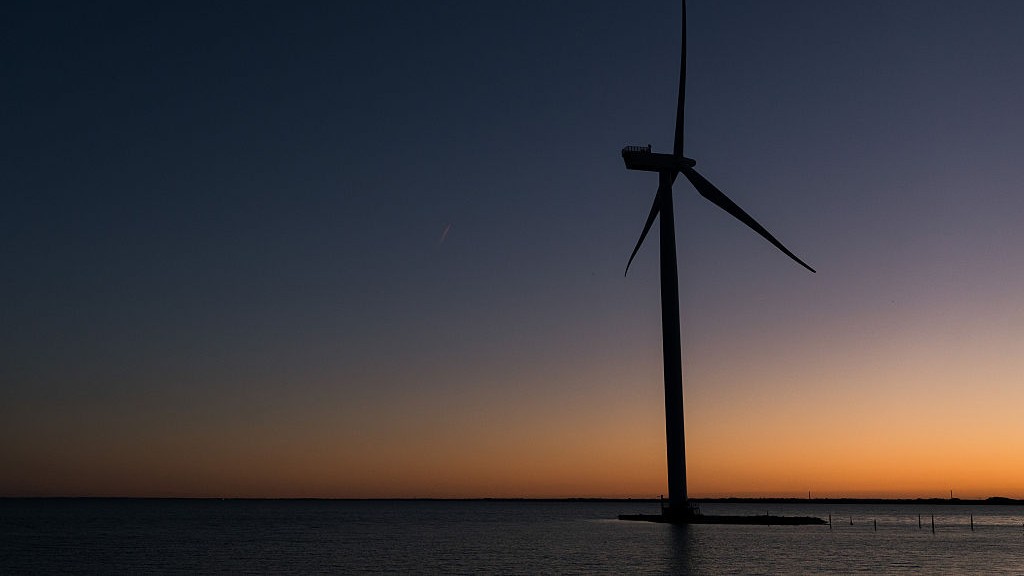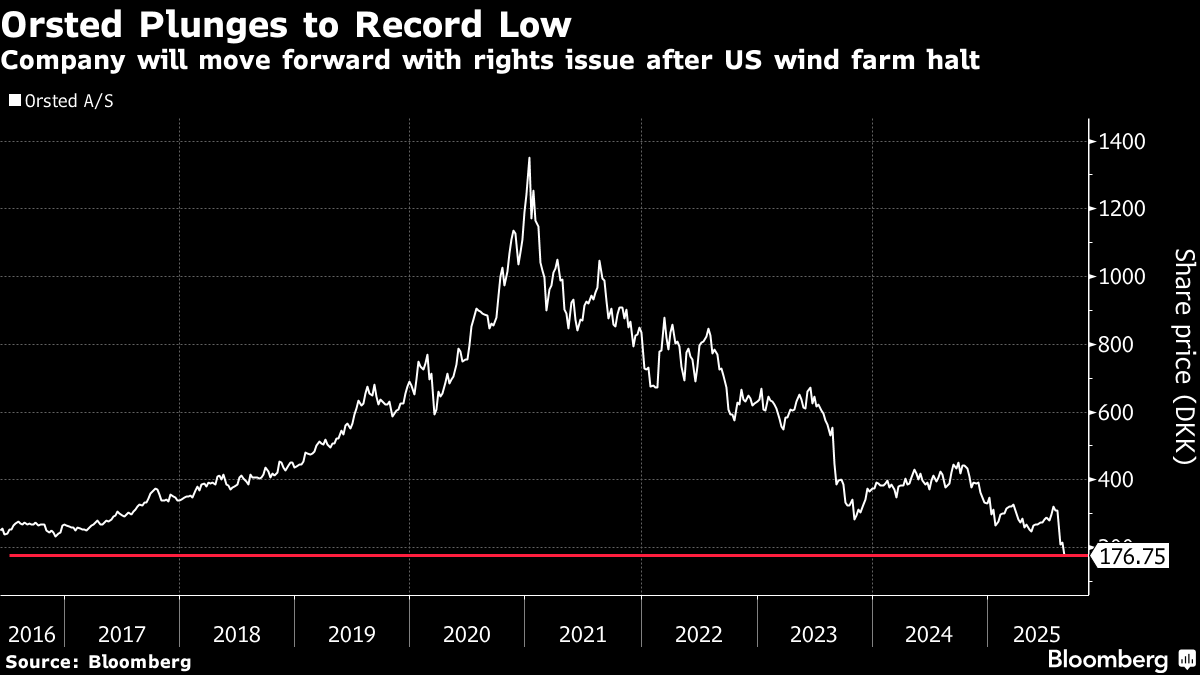Orsted Faces Growing Crisis After Trump Halts Work at Wind Farm
(Bloomberg) -- Orsted A/S shares fell as much as 19% to a record low after the Trump administration blocked construction of an almost-finished offshore wind farm, throwing a wrench into the Danish company’s planned 60 billion-kroner ($9.4 billion) share sale.
The stop-work order issued late Friday targeted Revolution Wind off the coast of Rhode Island and cited national security concerns for the decision. It’s the latest in a string of bad news for Orsted, which has already seen its credit rating being cut to the lowest investment grade. Its shares are down more than 40% this year, wiping nearly $8 billion off the company’s market value.
Orsted’s management will meet with investors and advisers in London on Tuesday to reassure them that the planned rights issue will go ahead despite the growing crisis. Orsted, which has yet to formally launch or price the offering, is being advised by banks including JPMorgan Chase & Co. and Morgan Stanley.
“We expect all of this to create a more challenging setup for the upcoming rights issue regarding issue price and investor demand,” Ahmed Farman, an analyst at Jefferies International Ltd, said in a note.

Trump’s intervention in the Revolution project is his latest move to halt the expansion of offshore wind, an energy source he has long disdained. The administration’s unprecedented attacks include halting new leases and permits, withdrawing millions of acres of ocean for development, and rolling back tax credits. The US Commerce Department launched a probe last week into imported wind turbine and parts that could lead to more tariffs.
“President Trump has been very consistent, he’s not a fan of wind,” US Environmental Protection Agency Administrator Lee Zeldin said in an interview with Fox News.
The stop-work order was issued just hours after Danish foreign minister Lars Lokke Rasmussen signed a climate agreement with California Governor Gavin Newsom, prompting speculation in Denmark that Trump made his move in retaliation.
The governors of Connecticut and Rhode Island said they are working to amend the decision.
“This political move by the Trump administration will drive up the cost of electricity bills and contradicts everything the administration has told us,” Connecticut Governor Ned Lamont said in a statement over the weekend. “It wastes years of state investment in renewable energy designed to diversify our energy supply and lower costs for families and businesses.”

For Orsted, one of the world’s largest offshore wind developers, the order marks a new low point in the company’s failed effort to replicate its European business in the US. In recent years, problems such as costly supply chain bottlenecks have forced the company to cancel two major projects and make a series of writedowns, and led to the replacement of top executives.
The uncertainty hovering over the sector has made it impossible for Orsted to sell a stake in Sunrise Wind, another wind farm it’s building off the coast of the US. The lack of additional funds from the sale of that project was given as the reason the company decided to raise money from investors.
Orsted sought to reassure investors on Monday that the fund-raising is still going ahead. It would be the biggest share sale for the European energy sector in over a decade.
“The planned rights issue has been sized to provide the required strengthening of Orsted’s capital structure to execute its business plan, even when taking into account the impact of this uncertainty on Orsted’s US offshore wind portfolio,” the company said in a statement.
The Danish government, which owns 50.1% of Orsted, still backs the capital raising, Finance Minister Nicolai Wammen said.
Still, investors will want to know whether the company can find an agreement to rescue Revolution — which is costing $4 billion to build, according to an estimate by Jefferies — or if it will be forced to abandon the nearly-completed project. Uncertainty could damage shareholder interest in the rights issue or even lead to the government increasing its stake in the company.
Earlier this year, Trump halted construction of another US offshore wind farm, Equinor ASA’s Empire Wind, but reversed course after reaching a deal with New York Governor Kathy Hochul that could allow new natural gas pipelines to be built in the state.
Orsted shares closed down 16% at 179.10 kroner. Eversource Energy, a US utility that has liabilities tied to Revolution, fell as much as 7.5%, the most since January 2024.
(Updates with EPA administrator’s comment in sixth paragraph.)
©2025 Bloomberg L.P.





